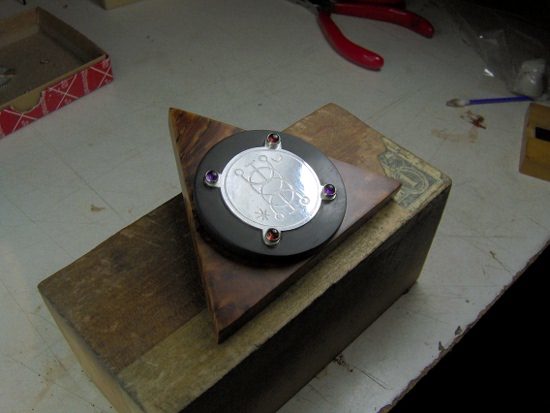Mousai notes:
Pindar, Nemean Ode 7. 12 ff (trans. Conway) (Greek lyric C5th B.C.) :
“If success crowns a man’s venture, sweeter then than honey the them he pours into the Moisai’s stream. But lacking the songs to praise them, the mightiest feats of valour can but find a sorry grave a deep darkness. But for fine deeds a mirror to establish, one way alone we know if Mnamosyna’s (Memory’s) shining diadem will grant recompense for their labours, in the glory of music on the tongues of men.” .Greek Lyric V Anonymous Scholia, Fragment 917c (trans. Campbell) (Greek lyric B.C.) :
“Gentle-eyed mother Mousa [Mnemosyne], keep company with the pure family of your children : we bring out a complex song, newly flowering with fresh-built skill.” .Pseudo-Hyginus, Preface (trans. Grant) (Roman mythographer C2nd A.D.) :
“From Aether and Terra [were born various abstractions] . . . [From Caelum (Ouranos) and Terra (Gaia) were born ?] Oceanus, Themis, Tartarus, Pontus; the Titanes : Briareus, Gyes, Steropes, Atlas, Hyperion, and Polus [Koios], Saturnus [Kronos], Ops [Rhea], Moneta [Mnemosyne], Dione.” .Pausanias, Description of Greece 9. 29. 1 (trans. Jones) (Greek travelogue C2nd A.D.) :
“The sons of Aloeus held that the Mousai were three in number, and gave them the names Melete (Practice), Mneme (Memory), and Aoide (Song). But they say that afterwards Pieros, a Makedonian . . . came to Thespiae [in Boiotia] and established nine Mousai, changing their names to the present ones . . . Mimnermos [epic poet C7th B.C.] . . . says in the preface that the elder Mousai are the daughters of Ouranos (Heaven), and that there are other and younger Mousai, children of Zeus.” .Arnobius, Against the Heathen 3. 37 (Roman Christian rhetorician C3rd A.D.) :
“We are told by Mnaseas [Greek writer C3rd B.C.] that the Muses are the daughters of Tellus [Gaia the Earth] and Coelus [Ouranos, Heaven]; others declare that they are Jove’s by his wife Moneta [Mnemosyne, Memory], or Mens (Mind) [Metis?]; some relate that they were virgins, others that they were matrons. .The Elder Muses, the Mousai Titanides are three in number and according to most accounts are the daughters of Ouranos and Ge [Heaven and Earth].
- Mneme [Mnemosyne, Moneta], “memory, mind” and as Moneta “warning, money, memory”
- Melete, “practice, exercise”
- Aoide, “song”
Cicero and Mnaseus give four Elder Muses by Heaven & Earth: Thelxinoe (“charming the mind”), Aoide (“song”), Arche (“beginning”) and Melete (“practice”)
According to several sources, Mnemosyne is the mother of the later and better-known Olympian Nine by Zeus (Mousai Olympiades- Ovid: the Mnemosynides). These muses had two main cult centers in Boiotia on Mt. Helikon and another in Pieria on the slopes of Mt. Olympus.
There are also the Mousai Apollonides, the three daughters of Apollon: Kephiso , Apollonis, and Borysthenis, also called Nete (lowest note of the lyre), Mese (middle note of the lyre) and Hypate (highest note of the lyre)
The Elder Muses seem to be more about the aspects of making whereas the Olympian Nine are personifications of particular varieties of the arts in expression that unfold from the creation process.
Mneme- the well of accumulated personal and cultural knowledge, the raw source material within (and without when including access to recorded research materials) that when combined with inspiration forms the embryonic Works, memorization and recall, one’s soul as “waxen receiver of impressions”
Plato, Theaetetus 191c (trans. Fowler):
“Sokrates : Can he [man] learn one thing after another? . . . Please assume, then, for the sake of argument, that there is in our souls a block of wax, in one case larger, in another smaller, in one case the wax is purer, in another more impure and harder, in some cases softer, and in some of proper quality . . . Let us, then, say that this is the gift of Mnemosyne (Memory), the mother of the Mousai (Muses), and that whenever we wish to remember anything we see or hear or think of in our own minds, we hold this wax under the perceptions and thoughts and imprint them upon it, just as we make impressions from seal rings; and whatever is imprinted we remember and know as long as its image lasts, but whatever is rubbed out or cannot be imprinted we forget and do not know.”.
Melete- muse of practice and exercises, willed shaping of one’s physical instrument
.
Aoide- “song”, performance, the living art in actuality as existing and doing what it does in the world, the creator speaking his or her living word through the Work.
